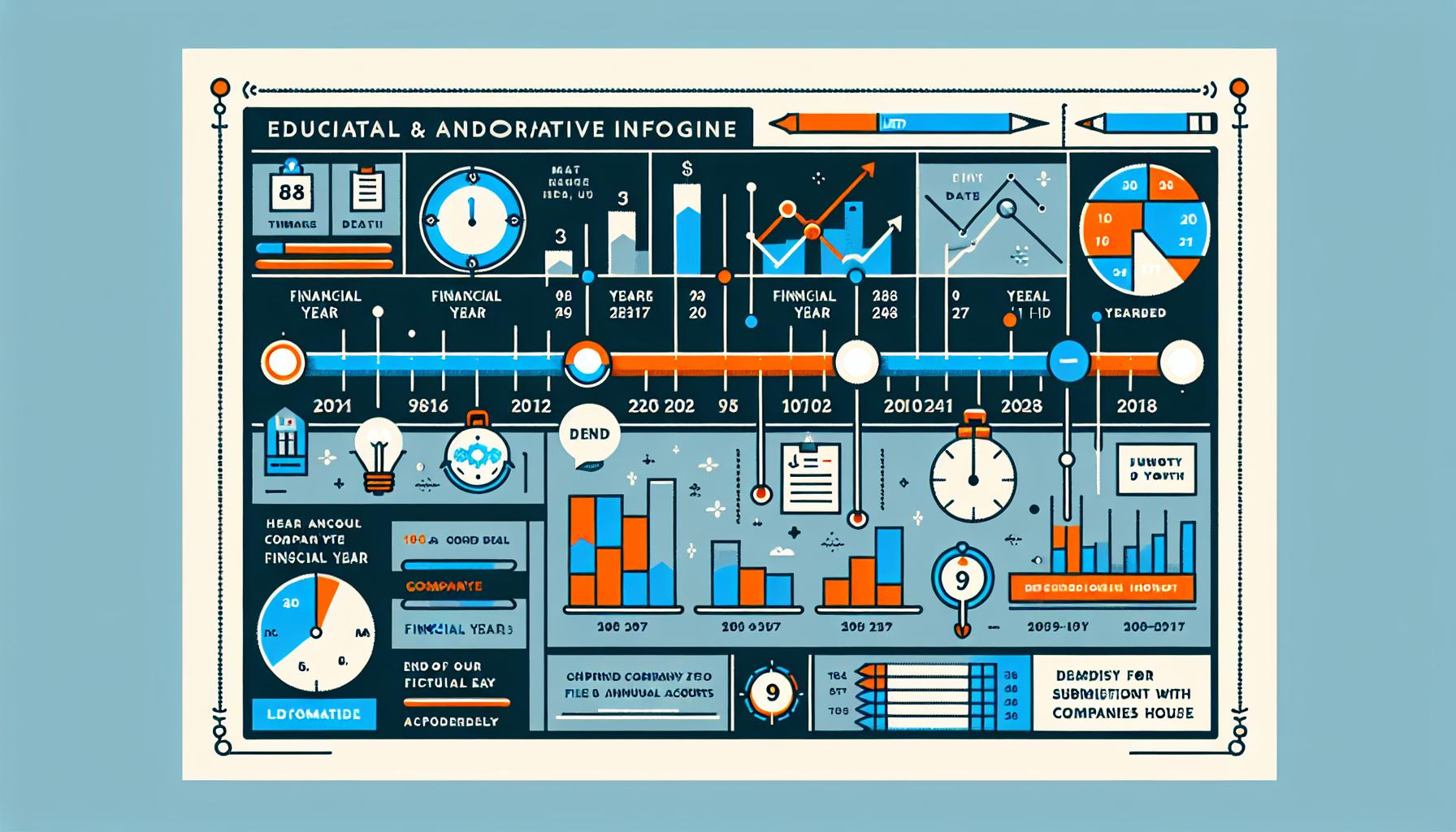January 20, 2024
Annual Filing Guide: Ltd Companies Account Submission Frequency
Exploring the world of Ltd companies can sometimes feel like you're trying to solve a complex puzzle, can't it? One piece that often trips folks up is knowing how often to file accounts. It's a crucial bit of admin that can't be overlooked – after all, staying on top of your financial responsibilities is key to keeping your business in good standing.
Ever found yourself scratching your head, wondering just how often those pesky accounts need to be submitted? You're not alone. It's a common question with a vital answer for accountants and business owners alike. Stick around and you'll discover the ins and outs of filing frequency that'll keep you in the clear.
Why filing accounts is important for Ltd companies
Understanding the whys and wherefores of filing accounts is just like keeping the health check-up records for your body; you need them to ensure everything's running smoothly. For a Ltd company, it's about transparency and trustworthiness. By filing your accounts regularly, you're showing a clear picture of your company's financial health to those who've got a stake in it – whether it's shareholders, potential investors, or lenders.
But it's not just about appearances. Here're a few key points to chew over:
Legal Requirements: It's not optional; it's the law. Failing to file your accounts could lead to penalties, or worse, dissolution of your company.
Tax Purposes: HM Revenue & Customs use your accounts to calculate your corporation tax. If they're incomplete or late, you could end up paying more than necessary, or you might face fines.
Credit Ratings: Lenders and suppliers often peek at your filed accounts to determine your creditworthiness. Regular filings can help maintain a good credit score.
Many folks mix up the filing of annual returns with accounts – they're cousins, but not twins. Annual returns are about who's running the show, whilst accounts are about the numbers.
As for the pitfalls, leaving everything until the 11th hour is common. Don't be that person who's scrambling to find receipts at year's end. Here's a better way to stay ahead:
Timely Record Keeping: Keep on top of this throughout the year.
Use Accounting Software: There're plenty of tools that can automate much of the grunt work.
Consult with Professionals: If the numbers game isn’t your forte, an accountant's expertise can save you both time and money in the long run.
Different methods apply depending on the size of your company. For small start-ups, it might be sufficient to handle things in-house. But as you grow, more sophisticated approaches could become necessary.
Incorporating best practices within your company's routine is a smart move. Establish monthly checks, schedule regular meetings with your accountant, and always plan for the future. Remember, your accounts aren't just a legal formality, they're a roadmap to your business's success.
Understanding the legal requirements for filing accounts

You're a savvy business owner, right? So, knowing when to file your accounts is like having your passport in check before a flight—it's essential. For Ltd companies in the UK, Annual Accounts must be filed with Companies House every year. Miss this deadline and you're looking at hefty fines, and no one likes unnecessary bills.
It's a bit like taking your car for an annual MOT test. Just as the MOT ensures your car's roadworthy, your accounts show your company's financial health. Now, the accounts need to be filed within nine months of your company's financial year-end. Let's break that down—suppose your year-end falls on March 31st; your deadline is on or before December 31st. Keep these dates closer than your morning coffee!
You'll also want to keep abreast of any changes to filing deadlines, such as those temporarily introduced during the Covid-19 pandemic.
Remember, it's not just about ticking a box. The information filed becomes a matter of public record, reflecting the company's reliability. This isn't just red tape; it's a showcase of your business transparency to potential investors, lenders, and customers.
Think it's just a load of paperwork? Well, these documents can be game-changers.
They include:
A balance sheet that snaps a picture of your assets and liabilities.
A profit and loss account that tells the tale of your earnings and expenditures.
Notes about the accounts which provide context—sort of the narration to your financial story.
A directors' report (unless you're a micro-entity) which is your chance to highlight achievements and goals, like the director's cut of a film.
It's easy to mix up the annual return (now called a 'confirmation statement') with annual accounts. Your confirmation statement is an annual update confirming the company’s registered details, like a yearly status update, while the accounts are all about the numbers.
To weave best practices into the fabric of your day-to-day business, set up reminders for important filing dates, organize your paperwork as it comes in, and have regular chats with your accountant. Using good accounting software can be a lifesaver, too – it’s like having a GPS for your finances, keeping you on track and timely.
Annual vs. abbreviated accounts: what's the difference?

When you're at the helm of a Ltd company, grappling with financial reports may seem daunting, but it's key to distinguish between annual accounts and abbreviated accounts. Think of annual accounts as a comprehensive physical health check-up for your business - they detail everything from your company's financial performance to its position at the year-end. In contrast, abbreviated accounts are the snippet version, offering just the essential highlights that satisfy legal requirements without disclosing full details to the public.
Breaking Down the Details
Let's slice through the jargon and drill down to what this really means. With annual accounts, you're submitting a full report card that includes:
A balance sheet: the financial 'snapshot' of assets versus liabilities.
A profit and loss account: this tells the tale of your earnings and expenditures.
Notes about the accounts: a detailed commentary on your financial data.
A director's report: yes, your own corporate narrative.
Abbreviated accounts, allowed until recently, were the no-frills edition you could share with Companies House. They spared you from revealing too much to prying eyes. But, a change in the law means small companies now file full accounts, but with a simplified set-up that requires fewer notes to the accounts and a shorter director's report.
Common Misconceptions and Pitfalls
It's a common blunder to think 'the fewer details, the better,' but skimping on your financial report can miss the mark. Consider annual accounts as a golden opportunity to showcase your company's robust financial state to potential investors, or to bolster your credibility with financial institutions.
Techniques and Practices
So how do you navigate these waters smoothly? First, start early to give yourself ample time. Gather your financial records like a squirrel prepping for winter - methodically and well in advance. If the nitty-gritty of balance sheets and P&L accounts aren't your cup of tea, partnering with a seasoned accountant isn't just helpful, it's savvy business acumen.
Keep in mind different techniques for compiling your accounts. Cash basis accounting might suit if you're turning over less than £150,000 a year. This is the accounting equivalent of a 'keep it simple' mantra, focusing just on money in and out. On the other hand, traditional accounting involves recognizing invoices and costs as they occur, not just when money changes hands.
Filing accounts for small, medium, and large Ltd companies
Exploring the maze of financial reporting might seem daunting at first, but understanding what's expected for small, medium, and large Ltd companies can simplify the process. Just like you wouldn't bring a suitcase to a quick supermarket trip, you won't need the same level of detail in your accounts as a small business as you would if you were a large corporation.
Small companies often benefit from fewer reporting requirements—it's like being allowed to skip some of the questions on a test. You'll still need to prepare your accounts but you're eligible to submit abbreviated accounts to Companies House. These won't include your profit and loss account and may have less detailed notes, making the process more streamlined.
Medium-sized companies sit in the middle, like a family car that needs more maintenance than a bike but less than a truck. You're subject to more reporting than small companies, with full accounts required including a profit and loss report, though you can still withhold certain details from the public record to protect your business privacy.
Moving up to large companies, the spotlight intensifies. Imagine you're packing for a month-long vacation - you'll need to be thorough. It's all about transparency, with full accounts needed, including a director's report and a strategic report. These give a detailed view of your company's financial health and performance.
When it comes to common misconceptions, don't think of these requirements as a one-size-fits-all. Each company's situation is unique and the categorisation into small, medium, or large is based on criteria such as turnover, balance sheet total and the number of employees. Missing these subtleties is like putting diesel in a petrol car—it can lead to costly mistakes.
Here are some tips to keep your filings in check:
Always check the latest thresholds for company sizes as these can change.
Keep detailed records throughout the year, so you're not scrambling last minute.
Utilise accounting software that aligns with your company size and reporting needs.
How to prepare and submit accounts for your Ltd company
Prepping your accounts for submission is like getting ready for a big presentation; you want to make sure everything is in place and you've addressed all the details. Think of your annual accounts as a snapshot of your company's financial health for the year. They need to tell a clear story of where you've been and how you're doing.
Start by gathering all your financial records – this is the bedrock of your accounts. It's similar to making sure you have all the ingredients before you start baking a cake. You'll need your bank statements, invoices, receipts, and any other financial paperwork. Having everything at hand makes the process smoother and less stressful.
Many business owners stumble over categorizing expenses or overcomplicating their records. You're not alone if you've ever scratched your head wondering whether a coffee with a client counts as an expense. Here's where keeping it simple pays off. If it was purely for business, jot it down. Mis-categorizing can lead to confusion and inaccuracies, so when in doubt, ask a professional.
Now for the juicy part – crunching the numbers. Depending on your company size, you may not need to do a full detailed report, but a profit and loss statement is generally a must. It's like checking your own personal bank account to see if you're living within your means. Are you making more than you're spending? That's what stakeholders want to know.
Using accounting software can save you a truckload of time and make sure you're aligned with reporting requirements. Some common mistakes here include forgetting to reconcile transactions or not keeping up-to-date records throughout the year. Imagine trying to remember every single thing you spent money on last year – sounds impossible, right? Regular bookkeeping can avoid this headache.
When your accounts are ready, you'll submit them online through Companies House Service. Think of it as hitting the 'send' button on an important email – once it's gone, it's out in the open. Ensure you've checked everything twice. Company directors are legally responsible for timely and accurate submissions.
Conclusion
Staying on top of your financial responsibilities is crucial for the health of your Ltd company. Remember to keep your records in order and use the right tools to streamline the process. With diligent preparation and a keen eye for detail, you'll navigate the submission of your accounts with ease. Don't forget to verify everything before you send it off to Companies House. It's your attention to these finer points that will keep your business compliant and running smoothly.
Frequently Asked Questions
What financial records are needed to prepare accounts for a Ltd company?
All financial transactions must be recorded, including invoices, receipts, expenses, and bank statements. These records are essential to create accurate accounts for the company.
How can accounting be kept simple?
To keep accounting simple, maintain organised records, categorize transactions correctly, and follow a consistent accounting procedure throughout the financial year.
What is a profit and loss statement?
A profit and loss statement is a financial document that summarises the revenues, costs, and expenses incurred during a specific period, usually a fiscal quarter or year.
Can accounting software help with preparing accounts?
Yes, accounting software can help streamline the accounting process, reduce errors, and ensure compliance with financial reporting requirements, saving time and effort.
What should be done before submitting accounts online?
Before submitting accounts online through Companies House Service, double-check all information for accuracy and completeness to avoid any issues or potential fines for incorrect filings.
Similar articles

January 20, 2024
Established fact that a reader will be distracted by the way readable content.

January 20, 2024
Established fact that a reader will be distracted by the way readable content.

January 20, 2024
Established fact that a reader will be distracted by the way readable content.


